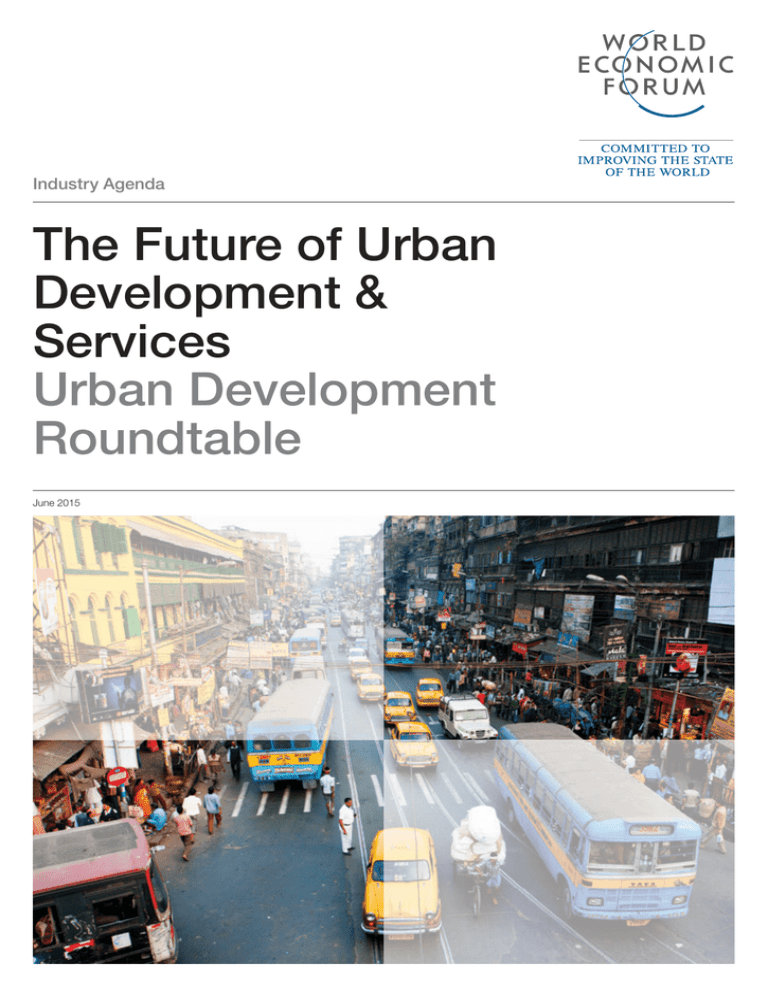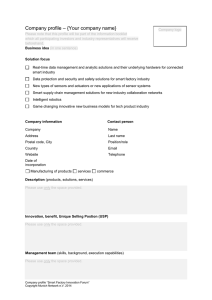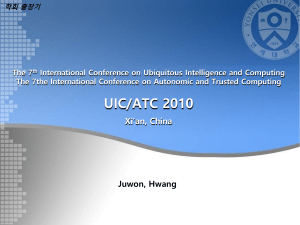
Industry Agenda
The Future of Urban
Development &
Services
Urban Development
Roundtable
June 2015
© WORLD ECONOMIC FORUM, 2015 – All rights
reserved.
No part of this publication may be reproduced or
transmitted in any form or by any means, including
photocopying and recording, or by any information
storage and retrieval system.
REF 300715
Introduction
Synopsis
The World Economic Forum’s Future of Urban Development
& Services (FUDS) initiative held a roundtable on
urban development in New Delhi on 16 June 2015.
Representatives of the government, the Forum’s Industry
Partners and guests from industry and civil society
discussed urbanization in India and looked to identify areas
of collaboration in light of the government’s aim to develop
smart cities across the country.
The Future of Urban Development & Services initiative:
its perspective on urbanization
At the roundtable, an initial presentation of the FUDS
initiative included an introduction to its work globally
and in India, as well as the findings of The Future of
Urban Development & Services: Urban Development
Recommendations for the Government of India, published
in April 2015. This report highlighted an opportunity to
assist the Government of India (GoI) on two programmes:
delivering “100 Smart Cities” as well as the cities of the
Atal Mission for Rejuvenation and Urban Transformation
(AMRUT).
The GoI’s aim with the two programmes is to drive
economic growth holistically and improve the quality of life
by enabling local development and harnessing technology
as a means to create smart approaches to urbanization. The
roundtable centred on how smart and innovative information
and communications technology (ICT), as well as physical,
economic and social infrastructure, can accelerate smart
and sustainable urbanization. It also highlighted the need to
accelerate reforms through public-private collaboration.
The main challenges and opportunities in developing smart
cities, across domains such as water, sanitation, energy,
mobility, infrastructure (physical, economic and social),
finance and governance, were covered in the breakout
groups. Ideas to fast-track development were proposed.
01
The Forum showcased its work in supporting cities to
tackle the challenges of urbanization. The Forum adopts
a consultative approach by bringing together government
representatives and business leaders across sectors such
as infrastructure, urban development, mobility, ICT, energy
and healthcare. The aim is to identify cities and assist them
in addressing challenges, and to enable them to transition
towards a smart, more sustainable future by adopting new
models of urban development.
The initiative’s Steering and Advisory Board worked with
leaders from national and city government in the Chinese
cities of Tianjin, Dalian and Zhangjiakou in 2012-2014 to
address the pressing urban development challenges facing
those cities. In 2015, the initiative has a global and regional
focus. At the global level, it will assess the opportunity
presented by the urban services industry, the barriers to its
success and the means to accelerate the delivery of smart
and innovative urban services. At the regional level, the aim
is to assist the GoI in delivering its planned 100 smart cities
and 500 AMRUT cities.
To start the process, the Forum produced The Future
of Urban Development Initiative: Urban Development
Recommendations for the Government of India, a macrolevel report that included the following recommendations:
–– The integration of spatial planning at national, state and
city levels
–– The creation of a stable policy framework for private
investment
–– The development of institutions to stimulate capacity
building
The initiative could work in specific Indian states and assist
them in developing tools and identifying reforms needed to
accelerate the delivery of smart and AMRUT cities. As a next
step, the initiative could become involved in an important
smart city pilot project, which could then be scaled up and
replicated across the country to transform urbanization.
02
01: Ajit Gulabchand, Chairman and Managing Director, Hindustan Construction
Company, India; and Honourable Minister M. Venkaiah Naidu, Minister of Urban
Development, Housing and Urban Poverty Alleviation and Parliamentary Affairs of
India, at the roundtable.
02: Honourable Minister M. Venkaiah Naidu, Minister of Urban Development, Housing
and Urban Poverty Alleviation and Parliamentary Affairs of India at the roundtable.
The Future of Urban Development & Services: Urban Development Roundtable
3
The Indian government’s response to
accelerating urbanization: smart city and
AMRUT programmes
M. Venkaiah Naidu, Minister of Urban Development, Housing
and Urban Poverty Alleviation and Parliamentary Affairs of
India, presented the government’s vision for addressing the
challenges and opportunities of rapid urbanization in India.
–– Two urban rejuvenation programmes are set to revitalize
the urban infrastructure and quality of life in Indian cities.
–– Globalization has triggered greater linkages between
India and the rest of the world. Global partnerships will
play a crucial role in the country’s urbanization process.
The wave of urbanization will not only have domestic
implications but will also create impact outside of India.
–– Indian cities are the backbone of the country’s global
trade. The government will focus on effective change
management in urban areas to achieve and sustain
economic growth.
–– According to the GoI, smart cities are those providing
core infrastructure and enabling a clean and sustainable
environment, while providing a decent quality of life and
promoting the adoption of smart solutions for effective
delivery of services.
–– The GoI will develop 100 smart cities via a mixed
strategy of improving existing cities through intensive
intervention (retrofitting), redeveloping non-amenable
areas through adoption of new layouts, taking up large
pan-city interventions and developing greenfield cities.
–– The GoI acknowledges and appreciates the
recommendations made by the FUDS report.
–– The GoI will take a bottom-up approach for both of the
urban development programmes by engaging states and
ULBs right from the conceptualization stage. The aim is
to create a sense of involvement and ownership for all
stakeholders, including citizens. The states will thus get
flexibility in designing and implementing new schemes,
which are expected to make cities more liveable,
inclusive and sustainable.
–– The 100 smart cities to be developed will be selected
through a two-stage city challenge competition. The
central, state and local governments will be allocated
$30 billion over the next five years to implement the
programme. However, the private sector will need
to invest a substantial share through public-private
partnership (PPP) models. This offers a huge opportunity
for domestic and foreign investors to participate in India’s
urban development.
The infrastructure and urban development
industry’s perspective
on urbanization
The Government of India has identified four infrastructural
pillars for accelerating smart urban development: physical,
social, economic and institutional. As perspectives on the
institutional (government) pillar were already provided, the
other three were covered along with technology, which cuts
across all pillars.
01
–– The other 500 cities will be developed under the AMRUT
programme.
–– Through these initiatives, the GoI will address the needs
of the urban poor and focus on developing public
transport to reduce societal inequalities and promote
inclusive urban development and mobility.
–– In addition to considering urbanization in India under the
Smart Cities programme, the global investor community
must also take into account the Digital India, Make in
India, Skill India and Clean India programmes to create a
holistic vision.
–– The following challenges must be addressed as India
shapes the transformation of its cities:
–– Effective planning for urbanization and zoning
–– Effective functioning of property markets
–– Access to serviced land and affordable housing
–– Access to mass transit systems and road networks
–– Division of power and financial autonomy between
urban local bodies (ULBs)
–– Creation of a favourable environment for starting,
operating and growing a business
–– Resource mobilization and citizen participation
4
The Future of Urban Development & Services: Urban Development Roundtable
01: Anil Menon, President, Smart+Connected Communities and Deputy Chief
Globalization Officer, Cisco Systems, India; Sunil Mathur, Managing Director and Chief
Executive Officer, Siemens India; Honourable Minister M. Venkaiah Naidu, Minister
of Urban Development, Housing and Urban Poverty Alleviation and Parliamentary
Affairs of India; and Ajit Gulabchand, Chairman and Managing Director, Hindustan
Construction Company during the roundtable.
Technological infrastructure
01
–– Digital technologies have been the focal point of
discussion regarding smart cities. However, the focus
should also be on smart governance, policy reforms
and smart regulations, which can enable PPPs and
the development of common and open standards – for
example in mobility, sanitation and utilities in an Indian
context – to achieve economic development goals as
well as social and environmental sustainability.
–– India could contribute substantially to the emerging
urban services industry, in which cities outsource the
operation and management of urban functions, such
as utilities and both public and road transportation.
Globally, the market for urban services is valued at about
$3 trillion, of which India could aspire to capture at least
10%.
–– Entrepreneurs can invent new business models and
leverage ideas from different city verticals (i.e. sectors
or services) to enhance efficiencies and share best
practices in managing urban infrastructure.
01: Onno Ruhl, Country Director for India, World Bank; Neel Ratan,
Senior Partner & Management Consultant Leader, PwC India; Anil Menon,
President+Smart+Connected Communities and Deputy Chief Globalization Officer,
Cisco Systems, India; Sunil Mathur; Honourable Minister M. Venkaiah Naidu, Minister
of Urban Development, Housing and Urban Poverty Alleviation and Parliamentary
Affairs of India; and Ajit Gulabchand, Chairman and Managing Director, Hindustan
Construction Companyd during the roundtable.
Physical infrastructure
–– Integrated physical infrastructure planning is needed,
which could include mobility, land use, utilities and
energy, keeping in mind the present and future
requirements of urban dwellers. Such integrated planning
helps to improve a city’s energy efficiency and its quality
of life.
–– The civic planning body will have to factor in the
particular requirements and customize solutions for each
city selected to be developed.
–– ICT will be an important lever for cities and will enable
them to leapfrog several stages of development. When
adopting technology, however, process re-engineering
should be provided as support to help streamline the
lengthy process of securing permits.
Social infrastructure
–– Urbanization generally drives city dwellers out of
poverty. But in the Indian context, poverty and informal
settlements are a major challenge. Urban regulations will
need to be adapted to address sustainable social and
economic growth.
–– Rapid urbanization is exacerbating environmental
pollution, which is one of the biggest problems facing
Indian cities. City governments must review building
codes and mobility plans to stem pollution and improve
the quality of life.
–– To accelerate reforms and implement the Smart Cities
programme, India needs stronger city government and
must implement the 74th constitutional amendment as
soon as possible. The latter would provide a framework
for devolving power from state to local governments.
Economic infrastructure
–– Reforms and policies need to be aligned with the
national focus on ease of doing business, manufacturing,
skill development and adopting technology. Creating
bankable projects at the city level is also required.
–– When reforming economic infrastructure, city leaders
must remain cognizant of the sharing and circular
economies, both of which have the potential to transform
the way urban dwellers consume services and products.
City leaders will also have to plan for economic policies
that cater to the city’s de facto boundaries, which are far
beyond its formal ones.
–– Balanced markets and resources are needed when
developing a greenfield city.
–– The concept of the “whitefield” city, which refers to
developing unutilized or underutilized land, should be
promoted.
The Future of Urban Development & Services: Urban Development Roundtable
5
Breakout Discussions
Participants defined smart cities in the Indian context,
identified the challenges of developing such cities and
made recommendations for further developing urban
infrastructure, which could help India leapfrog several stages
of development.
01
Smart energy infrastructure
The energy planning process was considered to be an
integral part of a smart city development programme. The
focus for both citizens and government must be on saving
energy, because energy saved is energy generated. In order
to build sustainable cities, the government should introduce
the parameter of gross domestic product per unit of energy
consumed, while determining funds awarded to the cities
competing in the smart cities challenge. A differential tariff
structure could be adopted to evenly distribute consumption
patterns.
Smart physical infrastructure
City masterplanning should include a citizen consultation
exercise, to capture their aspirations in the planning process
and ensure the adoption of citizen centric sustainable
development.
03
Smart water and sanitation
Participants agreed that the lack of bankable PPP projects,
the lack of trust between private investors and the
government, and the mindset of urban dwellers who do not
want to pay for water and sanitation are the key challenges
that must be addressed to transform water and sanitation
service in urban India.
02
01: Participants at the roundtable
02: Participants at the water and sanitation infrastructure breakout group, including
Nigel Austin, Managing Director, Arup Engineering, Design & Consulting Services,
India (Standing).
03: Participants at the smart physical infrastructure breakout group, including
Venugopal A. N., Managing Director, RMZ, India (standing).
6
The Future of Urban Development & Services: Urban Development Roundtable
Smart economic infrastructure
02
Smart cities should provide meaningful jobs to fulfil
their dwellers’ aspirations. The enablers of an improved
economic environment are: reforms to facilitate the ease of
doing business, reforms to the permitting process, creation
of a platform of collaboration between the public and private
sectors, and a more structured planning process. Each
city can be developed based on its distinctive economic
character, and innovation districts can be established to
ease the exchange of ideas and promote an entrepreneurial
culture. Cities can set up an economic advisory board
made up of the government, private sector, civil society
and academics to address the ease of doing business and
recommend reforms.
01
Smart social infrastructure
Technology can be used to improve healthcare services.
Streets play an important role in social infrastructure, and
master plans must include public space.
Smart ICT
A smart city needs to have an integrated digital master plan
which would account for standards across city verticals,
defined process and systems. Such a plan would need to
strongly encourage residents to adopt technology, and will
need to be inclusive, factoring in all sections of society.
Smart governance and finance
01: Participants at the smart economic infrastructure breakout group, including
Ron Slangen, Urban Development Specialist, Asian Development Bank INRM, India
(standing).
02: Participants at the roundtable
The transparency of projects needs to be increased,
along with the speed of their execution. The same can
be achieved by leveraging technology and capacity
building in ULBs. An integrated city master plan, a list of a
city’s bankable projects and the identification of risks will
encourage investors to participate in PPP projects.
Smart transportation
A mobility master plan can be prepared for a horizon
of about 20 years, with adequate transition plans to
support public transport. Cities may apply a congestion
tax or promote sharing of vehicles/carpooling to reduce
congestion on roads. To make implementation easier, a
single city-level agency can execute an integrated city
master plan, which factors in mobility. Moreover, the master
plan should consider developing clusters within the city
to reduce the need for transportation. Alternate and clean
modes of transportation, such as cycling and walking, must
be promoted to decrease the dependency on fossil fuels
and reduce pollution.
The Future of Urban Development & Services: Urban Development Roundtable
7
Next Steps
The Forum will begin its engagement with specific states in
India. Ideally, the process will include advising on specific
reforms at the state and city levels to accelerate the delivery
of smart cities.
The World Economic Forum’s National Strategy Day on
India in New Delhi, 3-4 November 2015, will convene a
discussion on smart cities and AMRUT cities.
8
The Future of Urban Development & Services: Urban Development Roundtable
List of Participants
Keynote Speaker
M. Venkaiah Naidu
Chair
Ajit Gulabchand
Minister of Urban Development, Housing and Urban Poverty Alleviation
and Parliamentary Affairs of India
Chairman and Managing
Director
Hindustan Construction Company Ltd
India
Discussion Leaders
Anil Menon
President, Smart+Connected
Communities; Deputy Chief
Globalization Officer
Cisco Systems Inc.
India
Neel Ratan
Senior Partner & Management
Consulting Leader, PwC India
PwC
India
Sunil Mathur
Managing Director and Chief Executive
Officer
Siemens Ltd
India
Onno Ruhl
Country Director
World Bank
India
Table Hosts and Rapporteurs
Nigel Austin
Managing Director
Arup Engineering Design and
Consulting Services India
Private Ltd
India
Ron Slangen
Urban Development Specialist
Asian Development Bank
INRM
India
Ravichandran
Purushothaman
President, Danfoss India
Danfoss A/S
Denmark
Arjun Dhawan
President
Hindustan Construction
Company Ltd
India
Sandeep Sibal
Vice-President, Business Development;
Head of Region
Qualcomm India Pvt. Ltd
India
Venugopal A. N.
Managing Director, Development
RMZ Corp.
India
Ratiranjan Mandal
Chief Executive Officer
SREI Infrastructure Finance
Limited
India
Alain Grimard
Senior Human Settlements Officer
United Nations Human
India
Settlements Programme (UNHABITAT)
Bazmi Husain
Country Manager and Managing
Director
ABB Ltd
India
Glen Reccani
Managing Director
Acciona Energy India Private
Limited
India
Srinivas Chary
Dean of Research and Management
Studies
Administrative Staff College of India
India (ASCI)
Participants
The Future of Urban Development & Services: Urban Development Roundtable
9
Partha Purkayastha
Managing Director
Amec Foster Wheeler India
Private Ltd
India
Ponugupati Solomon Herme
Joint Director
Andhra Pradesh Electricity
Regulatory Commission
India
Tallulah D’Silva
Architect and Partner
architecture R/T
India
B. Prasad Rao
Chairman
Bharat Heavy Electricals Ltd
(BHEL)
India
Tejpreet Singh Chopra
President and Chief Executive Officer
Bharat Light and Power
India
Vikram Desai
Director
Canada Pension Plan
Investment Board (India)
India
Devyani Rana
Director, Global Government and
Corporate Affairs
Caterpillar Inc.
India
Debasis Gupta
General Manager
CESC Limited
India
Amitabh Shrivastava
Director, Delhi Office
Confederation of Indian
Industry (CII)
India
Nagahari Krishna
Director, Strategic Initiatives and Industry Danfoss Industries Pvt. Ltd
Affairs
India
Carlalberto Guglielminotti
Chief Executive Officer
Electro Power Systems SpA
Italy
Norberto Cuenca
Head, Business Development for India
Enel Green Power
Italy
Nathan Andrew Nelson
Chief Representative, India
Export Development Canada
(EDC)
India
Sumeet Aggarwal
General Manager; Head, Business
Development and Strategic Alliances
Fortis Healthcare Limited
India
Karuna Gopal
President
Foundation for Futuristic
Cities
India
Mahinder Nath
Executive Vice-President and Head,
Business, South Asia
GDF Suez
India
Ipsita Dasgupta
Chief Commercial Officer
GE India
India
Sivaram Tadepalli
Chief Information Officer, Urban
Industries
GMR Group
India
G. V. Keshav Reddy
Business Development
GVK Power & Infrastructure
Limited
India
G. V. Sanjay Reddy
Vice-Chairman
GVK Power & Infrastructure
Limited
India
Rajan Samuel
Managing Director
Habitat for Humanity India
(HFH India)
India
Shom Hinduja
President, Alternative Energy and
Sustainability Initiatives
Hinduja Group of Companies
(India)
India
Rolita Patil
Lead, Strategic Initiatives Corporate
Affairs & World Economic Forum DRP
Hindustan Construction
Company Ltd
India
Kojin Nakakita
Managing Director
Hitachi India Pvt. Ltd
India
Pilar Gonzalez Fernandez
International Affairs, Chairman’s Office
Iberdrola
Spain
Alpna Jain
Director, Project Finance
IDFC Ltd
India
10
The Future of Urban Development & Services: Urban Development Roundtable
Jasjeet Hanjrah
Senior Consultant
IGATE
India
CM Khurana
Chief General Manager
India Infrastructure Finance
Co. Ltd (IIFCL)
India
Vishnu Agarwal
President
Indian Electrical and
Electronics Manufacturers
Association
India
Sudhir Krishna
Chairman, Bureau of Indian Standards
Committee on Defining Standards for
Smart Cities; Former Secretary of the
Ministry of Urban Development
Bureau of Indian Standards
India
Jyoti K. Parikh
Executive Director
Integrated Research and
Action for Development
(IRADe)
India
Neeraj Gupta
Senior Investment Officer
International Finance
Corporation (IFC)
New Delhi
Sreevatsan Sudhanvan
Bangalore
President, Urban Planning and
Development
Ispat Corp. Pvt. Ltd
India
Anup Bhargava
President
Jindal Steel and Power
Limited
India
Shubhranshu Pani
Managing Director, Infrastructure &
Urban Development
Jones Lang LaSalle Property
Consultants (India) Pvt. Ltd
India
Ajay Khanna
Chief, Strategic and Public Affairs
Jubilant Bhartia Group
India
Shabbir Kanchwala
Senior Vice-President
K Raheja Corp.
India
Meraj Ali Choudhari
DGM, Business Development &
Marketing
Mahindra World City
Developers Limited
India
Sunil Dubey
India Ambassador
Metropolis
Spain
Satya Sheel
Managing Director
Metrovalley
India
Neeraj Mandloi
Joint Secretary
Ministry of Urban
Development
India
Jagan Shah
Director
National Institute of Urban
Affairs (NIUA)
India
Ambuj Chaturvedi
Executive Director
Overseas Infrastructure
Alliance (India) Pvt. Ltd
(OIAPL)
India
Jaideep Bansal
Operations Manager
Procter & Gamble Hygiene
and Health Care Ltd
India
Shantanu Karkun
President and Chief Executive Officer,
Building & Infrastructure
Punj Lloyd Ltd
India
Surojit Bose
Director, Sustainability
PwC
India
Vijay Iyer
Managing Director, India
Rio Tinto Plc
India
Ravi Gadepalli
Programme Manager, Transport
Shakti Sustainable Energy
Foundation
India
Subodh Kumar Jain
Managing Director
Siddho Mal Group
India
Deepak Goray
Head, City Account Management
Siemens Ltd
India
The Future of Urban Development & Services: Urban Development Roundtable
11
Ramya Rajagopalan
Head, Corporate Communications
Siemens Ltd
India
Jagadish Nangineni
Regional Director, Delhi
Sobha Limited
India
Govind Subbanna
General Manager
State Bank of India
India
Ragnvald Naero
Senior Vice-President and Director,
Business Development
Statkraft AS
Norway
Siddharth Hande
Director
Supportive Cities
India
Emmanuel Guérin
Associate Director
Sustainable Development
Solutions Network
France
Ishwar Hegde
Chief Economist
Suzlon Energy Limited
India
Cristina Rumbaitis del Rio
Associate Director
The Rockefeller Foundation
USA
Vineet Agarwal
Managing Director
Transport Corporation of India India
Ltd
Amit Jain
Chief Executive Officer, India
Uber
USA
Shomik Mehndiratta
Director, Policy Development Asia
Pacific
Uber
USA
Aashish Kamat
Chief Executive Officer, India
UBS AG
India
Marina Walter
Deputy Country Director
United Nations Development
Programme (UNDP)
New Delhi
Kulwant Singh
Regional Advisor, Asia and the Pacific,
Urban Basic Services Branch
United Nations Human
Kenya
Settlements Programme (UNHABITAT)
Sanjay Mathur
Director and Representative
United Nations Office for
Project Services (UNOPS)
Copenhagen
Gaurang Pandya
President, UTC Building and Industrial
Systems, India
United Technologies
Corporation (UTC)
India
Chetan Vaidya
Director, School of Planning and
Architecture
University of Delhi
India
Amar Variawa
Director and Head, Public Affairs India
Vestas Wind Technology
Private Limited
India
Raghunath Mahapatra
Head, Strategy
Welspun Energy Pvt. Ltd
India
Vineet Mittal
Managing Director
Welspun Energy Pvt. Ltd
India
Joe Phelan
Director, WBCSD India
World Business Council for
Sustainable Development
(WBCSD)
Switzerland
Alex Winchester
Sector Director, Property
WS Atkins plc
India
Alice Charles
Head of Urban Development
World Economic Forum
Kavitha Sivadasan
Head of India and South Asia, Business
Engagement
World Economic Forum
Christoph Sprung
Associate Director, India and South Asia World Economic Forum
12
The Future of Urban Development & Services: Urban Development Roundtable
The World Economic Forum is a
comprehensive and integrated
platform to strategically shape
global, regional, national and
industry agendas.
The Forum helps the foremost
political, business and other
leaders of society to improve the
state of the world, serving as an
independent and impartial
partner and acting as the
officially recognized International
Institution for Public-Private
Cooperation.
World Economic Forum
91–93 route de la Capite
CH-1223 Cologny/Geneva
Switzerland
Tel.: +41 (0) 22 869 1212
Fax: +41 (0) 22 786 2744
contact@weforum.org
www.weforum.org






